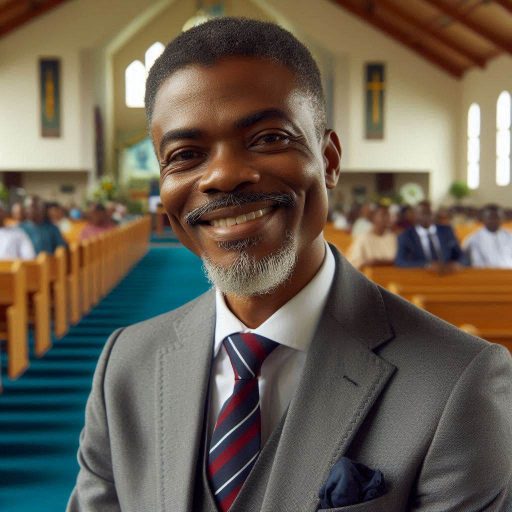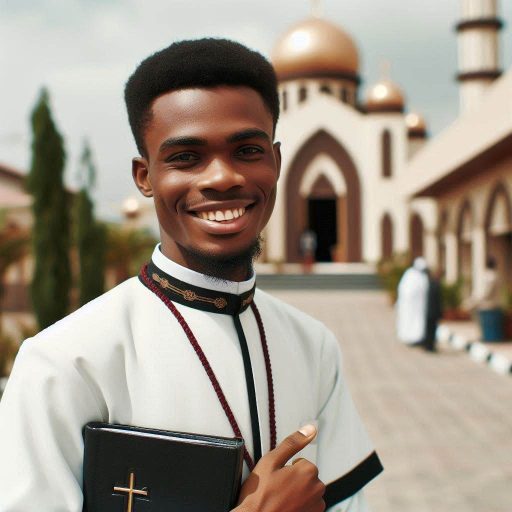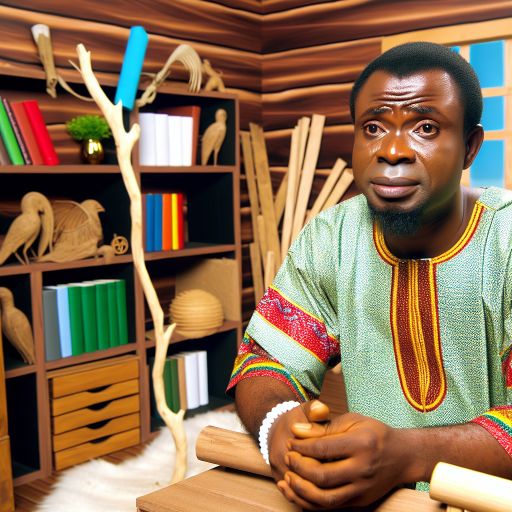Introduction
Religion plays a central role in shaping Nigeria’s culture and society.
The country’s religious landscape is diverse, including Christianity, Islam, and traditional beliefs.
Religious leaders hold significant influence over communities and national affairs.
Key religious professions are vital to promoting values, guiding communities, and fostering social development.
Top religious professions making an impact in Nigeria include:
- Pastors and Priests: They lead congregations and offer spiritual guidance.
- Imams and Islamic Scholars: They teach and interpret Islamic laws for the Muslim community.
- Traditional Priests: They preserve and promote indigenous spiritual practices.
These professionals contribute not only to spiritual well-being but also to education, peacebuilding, and social welfare.
This blog explores these professions and highlights their impact on Nigerian society.
Traditional Religious Leaders
Role of traditional rulers in upholding religious traditions
Traditional rulers play a vital role in upholding religious traditions in Nigeria.
They act as custodians of the ancestral beliefs and practices that have been passed down through generations.
These leaders are responsible for ensuring that these traditions are preserved and practiced within their communities.
Their influence in promoting cultural practices and unity in communities
Moreover, traditional religious leaders have a significant influence in promoting cultural practices and unity in communities.
They serve as pillars of guidance and wisdom, resolving conflicts, and fostering a sense of belonging among community members.
By upholding age-old customs, they contribute to the preservation of Nigeria’s diverse cultural heritage.
Examples of prominent traditional religious leaders in Nigeria
Examples of prominent traditional religious leaders in Nigeria include the Oba of Benin, the Emir of Kano, and the Obi of Onitsha.
These leaders are highly respected and revered within their communities, wielding significant influence and authority.
They play a crucial role in maintaining the social fabric of their societies and promoting peace and harmony among their people.
In fact, traditional religious leaders in Nigeria serve as essential figures in upholding religious traditions, preserving cultural practices, and promoting unity within communities.
Their influence and leadership are invaluable in maintaining the rich tapestry of Nigeria’s religious and cultural heritage.
Christian Pastors
Significant influence of pastors in shaping religious beliefs and values
Christian pastors play a significant role in shaping religious beliefs and values in Nigeria.
They are often regarded as spiritual leaders who guide their followers in understanding and practicing the teachings of the Bible.
Through their sermons, pastoral counseling, and community engagement, pastors influence the moral and ethical standards of their congregation.
Role of pastors in community development and social welfare
Moreover, pastors in Nigeria are actively involved in community development and social welfare initiatives.
They lead outreach programs that provide humanitarian aid, educational support, and healthcare services to marginalized populations.
By addressing the needs of the less privileged, pastors demonstrate compassion and promote social justice in society.
Popular pastors in Nigeria known for their impact on society
Some popular pastors in Nigeria known for their impact on society include:
- Pastor E.A. Adeboye: As the General Overseer of the Redeemed Christian Church of God (RCCG), Pastor Adeboye has spearheaded numerous projects in education, healthcare, and humanitarian aid.
- Bishop David Oyedepo: Founder of the Living Faith Church Worldwide, Bishop Oyedepo is renowned for his philanthropic efforts and commitment to empowering the youth through education and skills development.
- Pastor T.B. Joshua: The late founder of the Synagogue, Church of All Nations (SCOAN), Pastor Joshua was known for his healing ministries, charity work, and advocacy for peace and reconciliation.
In short, Christian pastors in Nigeria wield significant influence in shaping religious beliefs, fostering community development, and promoting social welfare.
Their dedication to spiritual guidance and social activism has made a lasting impact on the country’s religious landscape and societal well-being.
Read: Building a Community: A Nigerian Pastor’s Strategic Approach
Islamic Clerics
Important role of Islamic clerics in teaching and interpreting Islamic teachings
- Islamic clerics play a crucial role in teaching and interpreting Islamic teachings.
- They serve as spiritual guides and leaders within the Muslim community.
- Islamic clerics are highly respected figures who provide guidance on religious matters.
The influence of Islamic clerics extends beyond religious teachings
- They also play a significant role in promoting peace and unity among Muslims in Nigeria.
- Through their sermons and teachings, they emphasize the importance of tolerance and harmony.
- Islamic clerics work tirelessly to prevent conflict and promote understanding within the Muslim community.
Prominent Islamic clerics making a positive impact in the country
There are several prominent Islamic clerics in Nigeria who are making a positive impact.
- Sheikh Dr. Ahmad Abubakar Gumi is known for his efforts in promoting inter-religious dialogue.
- His messages of peace and unity have resonated with many Nigerians, both Muslims and non-Muslims.
- Sheikh Ibrahim Zakzaky, the leader of the Islamic Movement in Nigeria, is another influential cleric.
- Despite facing challenges, Sheikh Zakzaky continues to advocate for social justice and equality.
- Sheikh Abdul-Kareem Lawal is a respected scholar who focuses on education and community development.
In general, Islamic clerics play a vital role in shaping the religious landscape of Nigeria.
- They are not only spiritual leaders but also ambassadors of peace and unity.
- Their influence extends beyond the mosque, impacting society at large.
- Through their teachings and actions, Islamic clerics contribute to a more harmonious and understanding society.
Read: Legal Aspects and Regulation of Pastoring in Nigeria Today

Religious Educators
Role of religious educators in shaping the beliefs and values of the younger generation
- Religious educators play a crucial role in shaping the beliefs and values of the younger generation.
- They are responsible for teaching religious principles, ethics, and guiding the youth in moral decision-making.
- By imparting religious education, these educators help in fostering a sense of spirituality and faith among the youth.
Impact of Religious Education
- Religious education promotes tolerance and understanding among different religious groups in Nigeria.
- It helps in cultivating respect and appreciation for diverse beliefs, fostering harmony in a multicultural society.
- Through religious education, young individuals learn about the cultural heritage and traditions associated with different religions.
Significance of Religious Schools and Institutions
- Religious schools and institutions play a vital role in imparting moral values and character development to students.
- They provide a holistic approach to education by integrating spiritual and moral teachings with academic curriculum.
- These institutions serve as centers for spiritual growth, community service, and character-building activities.
Read: Spiritual Growth and Development: A Pastor’s Guide in Nigeria
Transform Your Career in Nigeria
Discover unmatched expertise with our personalized Career Consulting service. Navigate Nigeria’s job market with a strategy tailored just for you.
Get StartedMissionaries
Work of missionaries in spreading religious teachings and values in Nigeria
Missionaries play a vital role in spreading religious teachings and values in Nigeria.
- They are dedicated individuals who travel to different parts of the country to share their faith.
- Through their efforts, they help in promoting healthcare by setting up clinics and providing medical assistance.
- Education is another area where missionaries have made a significant impact in Nigeria.
- They establish schools and educational programs to empower the local communities.
- Missionaries also contribute to community development by initiating projects that improve living conditions.
Role in Promoting Healthcare
One of the primary roles of missionaries in Nigeria is promoting healthcare.
- They set up medical clinics in remote areas where access to healthcare is limited.
- Missionaries provide medical assistance, supplies, and treatments to those in need.
- By focusing on preventive care and education, they help improve the overall health of communities.
Role in Education
Education is another area where missionaries have made a significant impact in Nigeria.
- They establish schools, both formal and informal, to provide education to children and adults.
- Through these educational programs, missionaries empower individuals with knowledge and skills.
- They focus on providing quality education that is accessible to all, regardless of socio-economic status.
Role in Community Development
Missionaries also contribute to community development by initiating various projects.
- They work on infrastructure development, such as building roads, bridges, and schools.
- By addressing the needs of the community, missionaries help improve the quality of life for residents.
- Projects initiated by missionaries often have a long-lasting impact on the community.
Examples of Successful Missionary Work
Missionaries have made significant contributions in different parts of Nigeria, leaving a lasting impact on the communities they serve.
In northern Nigeria, missionaries have established schools that provide education to thousands of children.
These schools often become centers of learning, offering opportunities for students to excel academically and spiritually.
In the southeastern region, missionaries have built hospitals that provide much-needed healthcare services.
These hospitals save lives and improve the overall health of the local population.
In rural areas, missionaries have introduced agricultural programs that boost food production and improve living standards.
Their efforts help alleviate poverty and promote sustainable development.
In a nutshell, missionaries in Nigeria are dedicated individuals who play a crucial role in spreading religious teachings and values.
Their work in promoting healthcare, education, and community development has made a significant impact on the lives of many people throughout the country.
Read: Youth Engagement: How Pastors in Nigeria Are Connecting
Religious Scholars
Importance of religious scholars in interpreting and analyzing religious texts
Religious scholars are individuals who have dedicated their lives to studying and understanding religious texts, traditions, and teachings.
They are often seen as authorities in their respective religions and play a crucial role in interpreting and explaining religious doctrines to the faithful.
One of the primary responsibilities of religious scholars is to interpret religious texts accurately.
They delve deep into scriptures, traditions, and historical contexts to provide insights into the meaning and significance of various religious teachings.
Their interpretations help followers better understand and apply these teachings in their daily lives.
Their role in guiding religious practices and beliefs
Additionally, religious scholars guide the religious practices and beliefs of their followers.
They offer guidance on matters such as prayer, worship, rituals, and ethical conduct, helping individuals navigate their spiritual journeys and adhere to the tenets of their faith.
By providing moral and ethical guidance, religious scholars play a pivotal role in shaping the values and principles of their religious community.
Renowned religious scholars in Nigeria and their contributions to society
In Nigeria, there are several renowned religious scholars across different faiths who have made significant contributions to society.
These scholars have not only advanced the understanding of their respective religions but have also worked towards promoting peaceful coexistence and unity among diverse religious communities.
Some notable religious scholars in Nigeria include Sheikh Ibrahim Inyass, a prominent Islamic scholar known for his teachings on Sufism and spiritual purification.
His influence extends beyond Nigeria, with followers across the African continent and beyond.
Another influential figure is Pastor Enoch Adeboye, the General Overseer of the Redeemed Christian Church of God, who is renowned for his charismatic leadership and emphasis on prayer and evangelism.
These religious scholars have played a crucial role in guiding their followers towards a deeper understanding of their faith and promoting values of compassion, tolerance, and respect for others.
Through their teachings and advocacy, they have fostered a sense of community and unity among believers, contributing to the social cohesion and harmony of Nigerian society.
Conclusion
Religious professions play a vital role in shaping the cultural and moral landscape of Nigeria.
Importance of Religious Professions
They provide spiritual guidance, moral teachings, and support for individuals and communities.
Religious leaders serve as role models, fostering unity and promoting social cohesion.
Positive Impact on Society
Through their charitable works and humanitarian efforts, they address societal challenges and uplift the needy.
They advocate for justice, peace, and equality, contributing to a harmonious and compassionate society.
Encouraging Further Exploration
Research into the diverse religious professions in Nigeria can offer insights into their influence and significance.
Understanding the intricacies of religious practices can foster tolerance, respect, and collaboration among different faith traditions.
All in all, religious professions in Nigeria are indispensable for fostering spiritual growth, promoting social harmony, and addressing societal issues.
Exploring the positive impact of religious leaders can inspire individuals to appreciate the importance of faith-based initiatives in creating a better world.
Explore and research religious professions in Nigeria to better understand and appreciate their societal contributions.
Deepening knowledge about these professions highlights their significant impact on communities across the country.
Publish Your Professional Profile, Business or Brand
Showcase your expertise, gain trust, and boost visibility instantly on Professions.ng.
Publish Now



